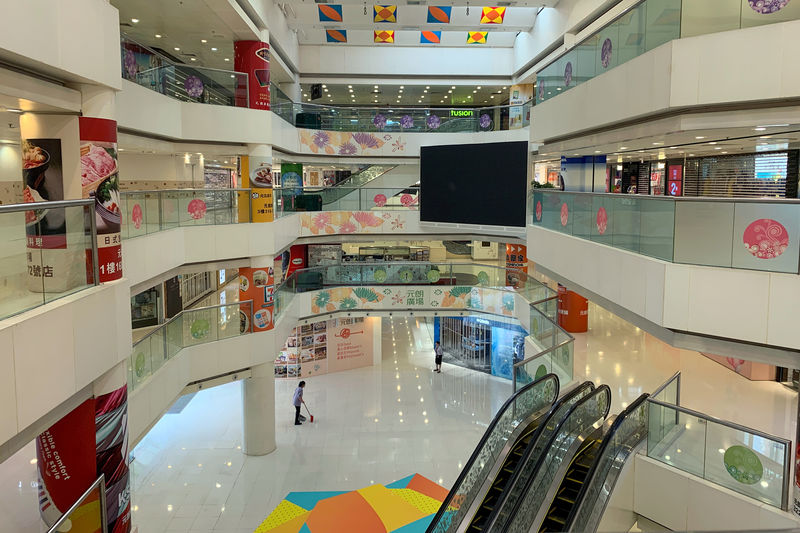By Donny Kwok and Twinnie Siu
HONG KONG (Reuters) - Hong Kong's July retail sales sank by the most since February 2016 amid anti-government protests that have gripped the Chinese-ruled city for months.
Retail sales in July fell 11.4% from a year earlier, government data showed on Friday, as social unrest hurt consumer sentiment and visitor arrivals started to fall.
Unrest in Hong Kong escalated in mid-June over a now-suspended extradition bill that would have allowed people to be sent to mainland China for trial in Communist Party-controlled courts.
The protests, which at times have turned violent, have evolved into broader calls for democracy for the former British colony which returned to Chinese rule in 1997.
Retail sales fell to HK$34.4 billion ($4.4 billion) in July, a sixth consecutive month of declines. June's decline was 6.7%. In volume terms, retail sales in July fell 13%, compared with a 7.6% fall in June.
For the first seven months of 2019, retail sales fell 3.8% in value from a year earlier and 4.4% in volume terms.
Many businesses in Hong Kong are already facing strains from China's economic slowdown, a weak Chinese yuan and fallout from the Sino-U.S. trade war, while businesses say violence has added to the toll on tourism and the pivotal retailing industry.
"The situation may deteriorate further if the social incidents involving violence do not come to a stop," a government spokesman said, adding Sino-U.S. trade tensions and subdued economic conditions continued to dampen sentiment.
Banks are issuing unprecedented profit warnings, while hotels and restaurants are half empty. Several global events have been postponed and economists say retail sales, a key economic pillar in the Asian financial hub, could drop by 20%-30% this year.
Hong Kong is also facing its first recession in a decade, with the government recently cutting its full-year 2019 growth forecast to 0-1%, down from 2%-3% previously.
The Hong Kong Retail Management Association urged landlords to halve rents for six months and expected some retailers may have to sack staff or even shut down.
TOURISM HIT
Retailers had said they expected sales for July and August to drop by double-digit percentage points from a year earlier, while hoteliers are bracing for a wave of cancellations.
The city's Federation of Trade Unions said hotel occupancy rates fell 20% in June from a year earlier, and probably 40% in July.
Tourism, especially from mainland China, has dropped markedly. Britain, Japan, Singapore and others have issued travel alerts.
"Tours from the mainland dropped by more than 90% in August, and many related workers were forced to take no pay leave," Paul Leung, chairman of Hong Kong Inbound Travel Association, told Reuters. He said the number of mainland tours had been cut to only 14 a day from 300-400 tours in the same period in 2018.
July tourist arrivals fell 4.8% on year to 5.197 million, according to the Hong Kong Tourism Board, the first decline since January 2018 and the biggest percentage drop since August 2016. (https:// That compared with 8.5% growth in June. Mainland visitors fell 5.5% in July, accounting for 80.1% of the total.
New York-based luxury jeweler Tiffany & Co (N:TIF), which operates 10 stores in its fourth-largest market in Hong Kong, said protests disrupted business.
Department store operator Lifestyle International (HK:1212) said outlook for the city's retail sector was challenging as people lose the appetite to consume.
Jewelry retailer Luk Fook (HK:0590) saw its same store sales in Hong Kong and Macau fell 10% in the April-June quarter, while smaller rival Chow Sang Sang (HK:0116) recorded an annual double-digit percentage drop in same store sales in June.
"Well into the third quarter there is still no end in sight for the civil unrest in Hong Kong," said Chow Sang Sang chairman Vincent Chow.
The Hong Kong Retail Management Association has changed its full-year retail sales forecast to a double-digit percentage fall instead of single-digit growth.
Sales of jewelry, watches, clocks and valuable gifts plunged 24.4% on-year in July, data showed, after a 17.1% drop in June.
Medicines and cosmetics fell 16.1% in July, compared with revised 4.5% fall in June. Department store sales dropped 10.4% in July, against a 6.0% drop in June.
